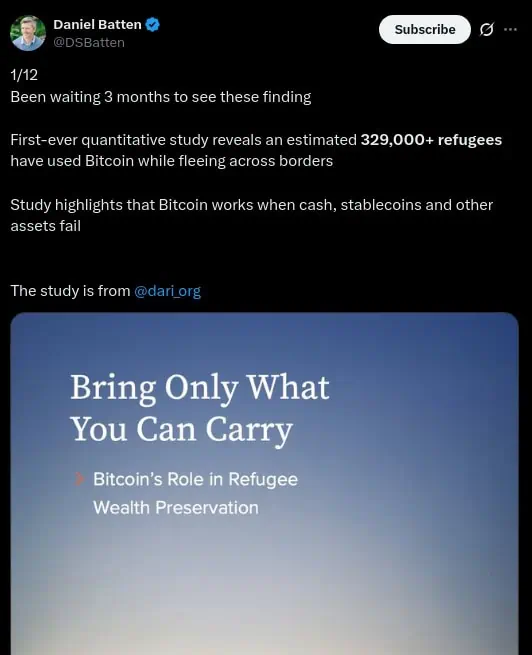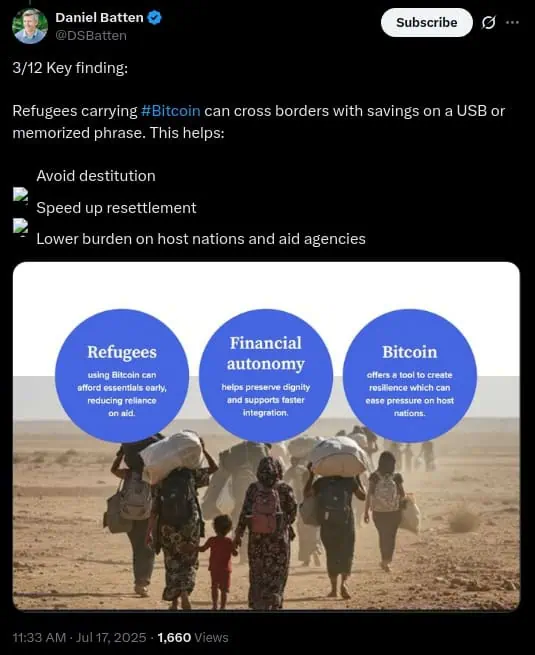
A groundbreaking study reveals that more than 329.000 refugees have used Bitcoin to protect their savings, cross borders, and finance their resettlement. The leading cryptocurrency is emerging as a humanitarian tool in global crises.
The report, led by Daniel Batten and backed by the Digital Assets Research Institute next to Human Rights Foundation, represents the first quantitative study on the use of Bitcoin by refugees and positions the leading cryptocurrency as a financial resilience tool in crisis contexts.
This discovery redefines the role of digital assets in the humanitarian field, distancing them from the stigma of speculation and bringing them closer to the reality of those facing authoritarian regimes, economic collapse, and forced displacement.
In a world where financial mobility It can mean the difference between survival and exclusion. Bitcoin is consolidating its position as a silent, accessible, and resilient lifeline. The study not only quantifies its impact but also projects exponential growth in its adoption among vulnerable communities.
Take your value with you: Access Bitcoin with Bit2MeBitcoin: More than a cryptocurrency, a lifeline
The dominant narrative about Bitcoin typically focuses on its volatility, its potential as a store of value, or its role in financial decentralization. However, Batten's study introduces a radically different dimension: its usefulness as a survival toolFor refugees, Bitcoin represents a way to preserve autonomy amidst chaos. It's not about speculation, it's about access.

Unlike fiat money or cash, which can be confiscated, or gold, which is difficult to transport, Bitcoin is stored in a simple recovery phrase. This portability digital allows refugees to cross borders without losing their savings, avoiding intermediaries and banking restrictions. In addition, censorship resistance makes it a viable option in contexts where traditional financial systems have collapsed or have been co-opted by repressive regimes.
El report highlights that Bitcoin not only facilitates financial mobility, but also reduces dependence on external aid. By allowing direct transactions, refugees can integrate more quickly into local economies, pay rent, buy food, or finance education. This financial autonomy preserves dignity and accelerates the resettlement process. In this sense, Bitcoin is not just a technology; it's an infrastructure of empowerment that operates outside of geopolitical constraints.
The study that changed everything
According to the study published by Batten, and supported by the Digital Assets Research Institute and the Human Rights Foundation, Bitcoin has emerged as a crucial tool for preserving the economic stability of more than 329.000 refugees, who have found in this cryptocurrency a means to protect their wealth, cross borders, and finance their resettlement. However, the expert acknowledged that this figure could be much higher than officially known, as many uses remain outside of formal records and it is not always possible to link transactions to verified identities.
Create your free account and trade Bitcoin without bordersThe study emphasizes that what makes Bitcoin a powerful ally in these circumstances is its decentralized and global natureWhile traditional banking systems are often inaccessible to those on the go or lacking formal documentation, Bitcoin allows these people Maintain control of your money, without intermediaries and without the usual geographical or political barriersThis doesn't mean it replaces traditional humanitarian aid, but rather becomes a vital complement that enhances personal autonomy and resilience in crisis contexts.
According to the findings, instead of carrying cash, which can be lost or snatched, refugees can cross borders with their savings stored in a digital wallet which can be accessed from anywhere in the world.

Batten also noted that Bitcoin not only allows refugees to avoid falling into destitution, but also speeds up the resettlement process, as they have immediate resources to cover basic needs. Furthermore, cryptocurrency reduces pressure on host countries and aid organizations, allowing for more efficient management and less dependence on external donations.
In fact, this use of Bitcoin represents a smart and modern way to preserve dignity and financial autonomy in situations of extreme vulnerability, demonstrating how digital technologies can become powerful tools for survival and hope.
More than 6,5 million refugees will have brought Bitcoin across borders.
The projections are astonishing: if Bitcoin adoption continues to grow at its current pace, by 2035 At least 7,5 million refugees could use this technology to secure their assets and manage their personal finances. Real-life cases in areas such as Ukraine, Gaza or Congo illustrate how the market-leading cryptocurrency already plays a tangible role in situations where conventional financial infrastructure collapses or is inaccessible.
Thus, beyond its speculative use, Bitcoin is emerging as a humanitarian tool with transformative potential, capable of giving millions of displaced people another option to preserve their economic dignity and build a future with greater autonomy and security.
Bitcoin is financial mobility. Bit2Me gives you access.The future of Bitcoin in humanitarian aid
As the number of refugees surpasses 100 million globally, according to UNHCR figures, the need for flexible and accessible financial solutions becomes critical. Bitcoin, with its ability to operate without intermediaries, emerges as a viable option to preserve assets, facilitate resettlement, and reduce dependence on traditional banking systems.
Batten's study raises a key question: Are policymakers ready to integrate Bitcoin into their humanitarian aid strategies? Until now, most regulatory frameworks have approached cryptocurrencies from a financial or tax risk perspective. However, this approach ignores their potential as a tool for inclusion. To maximize their impact, governments and multilateral organizations must recognize their usefulness in crisis contexts and design policies that facilitate their use without blocking the lifelines they offer.
In addition, the report suggests that humanitarian organizations could train their teams in the use of Wallets, establish crypto distribution protocols, and collaborate with platforms that guarantee security and traceability. In this scenario, Bitcoin would not replace traditional aid, but would complement it, offering an additional layer of resilienceBased on this, experts point out that the future of humanitarian aid could lie in the convergence of technology, financial autonomy, and decentralization.
Daniel Batten's study marks a turning point in understanding the role of Bitcoin in humanitarian crisis contexts. With more than 329.000 refugees already using this cryptocurrency to preserve their assets, cross borders, and rebuild their lives, it demonstrates that, far from being a speculative tool, Bitcoin also functions as a financial lifeline that operates silently but with a tangible impact.
As global crises intensify, Bitcoin's potential as humanitarian infrastructure will continue to grow. Its ability to offer autonomy, mobility, and resilience makes it an unexpected ally for the most vulnerable.
Create your crypto account now and trade BTC

